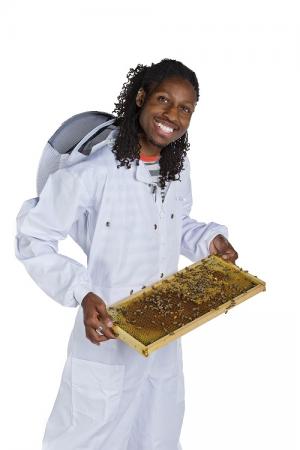Contact: Mary Carroll-Mason, mcmason@umd.edu, 301.405.7792
 Samuel Ramsey, a PhD candidate in entomology, is the University of Maryland’s representative in the Three Minute Thesis (3MT) competition, sponsored by Universitas 21, an international network of research universities. In the competition, Ramsey and the other competitors are judged on their ability to communicate the significance of their doctoral research to a non-specialist audience in just three minutes.
Samuel Ramsey, a PhD candidate in entomology, is the University of Maryland’s representative in the Three Minute Thesis (3MT) competition, sponsored by Universitas 21, an international network of research universities. In the competition, Ramsey and the other competitors are judged on their ability to communicate the significance of their doctoral research to a non-specialist audience in just three minutes.
Ramsey’s research is on a tiny parasitic mite, Varroa destructor, which is the single biggest contributor to the decline in health of honey populations worldwide. Originating in Asia, the invasive Varroa mite is wreaking havoc on honey bee colonies, both by feeding on adult and immature bees and by serving as a vector for five debilitating viruses.
For nearly 50 years, researchers have believed that the mite fed on the hemolymph (the “blood”) of the honey bee. Ramsey has done extensive research on the feeding habits and nutrition of the Varroa mite that provides strong evidence that this model is incorrect, and that current methods of controlling the parasite are not only ineffective, but contribute to pesticide resistance.
Ramsey’s research establishes that the mites are primarily feeding on the honey bee’s fat body tissue—an organ in insects that serves a similar role to the human liver. Since many of the existing systemic pesticides designed to combat the mite were formulated assuming the mites fed on the hemolymph, this discovery explains why these never succeeded as a control measure. This frequent exposure may also contribute to future pesticide resistance as well since the mites would not ingest enough pesticide to kill them. This work also explains why honey bees suffer so many negative consequences from a parasite we believed was only consuming a small amount of their blood. Ramsey’s discovery will enable researchers to develop more targeted control techniques that could help restore honey bee populations worldwide.
The Graduate School conducts an annual 3MT competition for University of Maryland students. The winner of the competition is also named as UMD’s nominee to the international U21 competition. Ramsey and 16 other graduate students emerged as finalists from hundreds of students competing in 11 countries. They will contend for three prizes: Judges’ First Place, Judges' Highly Commended, and People's Choice.
University of Maryland students have a highly successful track record in the 3MT contest. In 2015, University of Maryland representative, Carly Muletz Wolz, a doctoral candidate in biological sciences, won the People’s Choice award. In 2014, the first year that UMD entered the competition, Amy Marquardt, who completed her PhD in material science and engineering, won both the Judges’ First Place and People’s Choice awards.
Vote now for Ramsey’s video for the People’s Choice award at www.u213mt.com; voting ends on Monday, October 23. Results will be announced on October 31.
Photos of Samuel Ramsey courtesy of John Consoli/University of Maryland.
